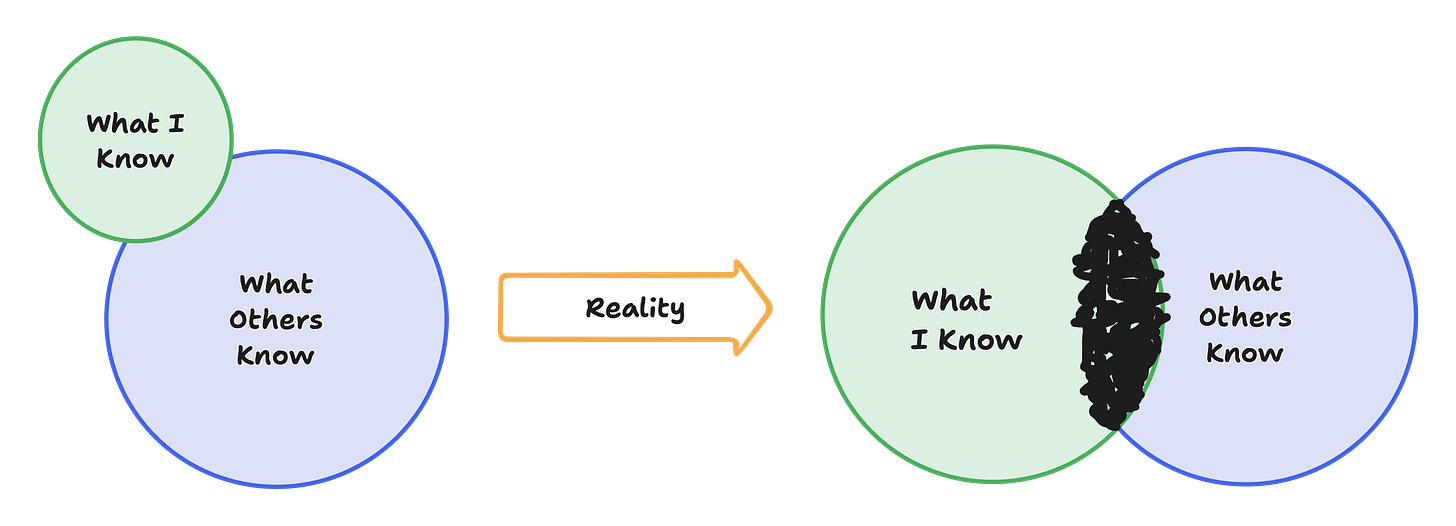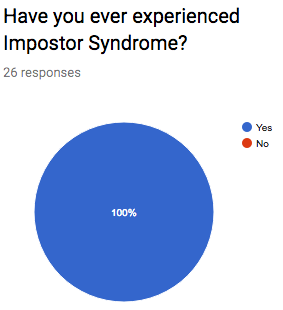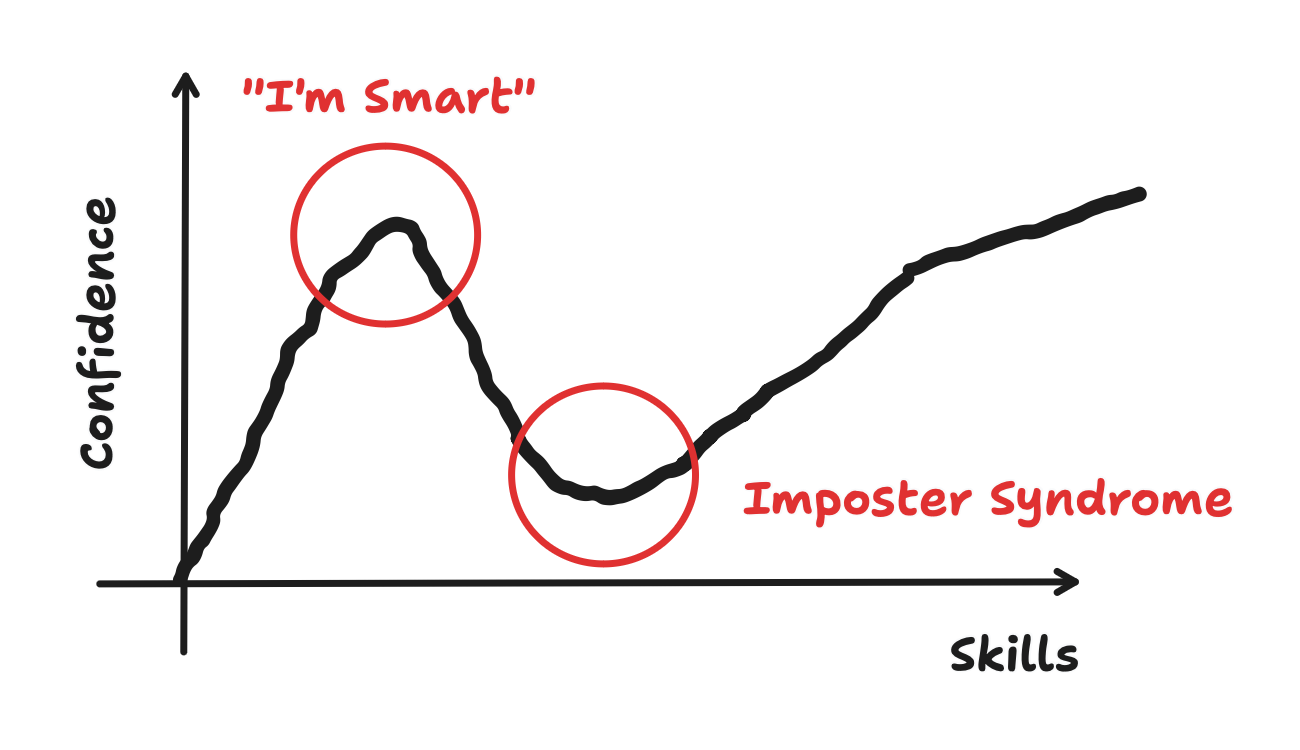Imposter Syndrome: If you have it, you are good
Look. If you are reading this, you probably have it. There is no permanent cure. You have to embrace it.
CEOs and top executives
Middle managers
Entrepreneurs and startup founders
Academics and researchers
Artists and creative professionals
Writers and authors
Software engineers
...
What do all these have in common ? Yup, they all feel like imposters at some point in their lives.
In more than half a decade of experience, I lost count of the times that I had it. The fear of being fake.
Now ? I just embrace it and use it to my advantage.
You probably heard of it
Throughout your career, you had someone mention it to you one time. You probably felt the same and thought that you aren't alone in the world.
Guess what ? You aren't.
The term Imposter Syndrome was first coined in 1978 by Pauline R. Clance and Suzanne A. Imes. (source)
To keep it simple, Imposter Syndrome is a psychological phenomenon in which you feel like a fraud (Imposter) even if you are really good at something.
You completely ignore your success, achievements, goals reached, etc., all of these with proper evidence.
It will impact you. It will impact your mental health, your anxiety, your self-esteem, your stress, and the people around you.
And no, you can't fix it with drugs.
It's just a matter of time ⏳
There will be a time in your career/personal life (you probably already reached that time) where you will feel doubts about yourself.
The probability of this happening is higher in non-technical roles, like management. The work you do in this scope is less "tangible". You don't have tickets or tasks that you can mark as completed. You have way more meetings. It's a never ending work to achieve bigger goals.
Because of this, you feel that you are doing nothing special, and your peers are doing all the hard work.
But this can go both ways, too. With remote work becoming more common, Individual Contributors tend to feel the syndrome more often due to the lack of their manager's feedback or the poor visibility of their work.
No matter who you are, you will be impacted by it.
The "I'm Smart" effect 🧠
There's one effect that goes pretty hand in hand with the imposter syndrome. The Dunning-Kruger effect. Or, as I like to call it, the "I'm Smart" effect.
The Dunning-Kruger effect, shows that people with lower skills tend to be more overconfident about their abilities, and when their skills start to improve, their confidence starts to go down. This is where the Imposter Syndrome likes to appear.
This is why I think that if you have Imposter syndrome, you are good. You don't consider yourself the best, and you now have solid skills.
From now on, you can only improve.
You will eventually find balance, but until then, you have to handle the imposter.
Why it can be good 🌟
Ok, you are at your lowest. You feel like a fraud. Is this bad ?
Well yes and no.
Yes, because it will impact you and your self-esteem in the short term.
No, because you will want to get over it. You will trigger actions that will make you feel more confident.
You have been assigned a new task.
Someone asked you to create a new infrastructure to handle a simple e-commerce website. At the start, you start to feel the pressure, and the imposter syndrome starts to creep in.
You have already worked with multiple e-commerce websites, and you know the general wit of it. But, at that moment, you choose to ignore your past achievements.
What can you do to get rid of this pressure?
You start by searching for similar architectures for the infrastructure that was assigned to you. You start to get familiar with the concepts again.
Not only that, but you start to remember similar work that you did in the past, and you just need to change some minor things.
Your confidence builds up. Once again, you managed to find balance. You got rid with some of the pressure. At the same time, you learned more useful skills that will compound throughout your career.
This was a very simple example, but the core of it is: pain in the short term, rewards in the long term.
You can also be the other kind of person who does nothing and just complains that things are hard and that you are afraid. Well, good luck to you :D
Imposter Syndrome in Engineering Teams 👨💻👩💻
As you saw, the syndrome will impact people. It will impact people's mental health and people's confidence.
This can happen in your engineering teams and you need to be on the lookout for it.
It can happen for several reasons:
New technologies emerging. 🚀
Deadline pressures. ⏰
Complexity of the product. 🧩
Comparison with other peers 👥
If you assign a task to an engineer and you start to see him having doubts about himself, this can impact the morale of the whole team.
Remember, a team is as strong as your weakest link. I truly believe that. It's like having 100000 MB/s of bandwidth available, but your computer can only download at 100 MB/s.
It's your job to help this engineer get through the task and learn at the same time. If you do this, you are helping your entire team.
Your engineer will have a boost in his self-esteem. Not because of you. But because, for him, he is contributing to the team. He is helping the team. He is moving along with the team.
He is part of the team.
This is what most of the engineers want. To feel that they contribute to a team, to a product, to a goal.
Just embrace it 🌱
Every time that you notice that you are starting to feel like a fraud, embrace it as an opportunity to grow and to learn more. As an opportunity to get out of your comfort zone.
It will happen more often than you think. Just be graceful for it.
I know that these are just words, and words mean nothing. But actions do.
You need to take action on it. Do not be consumed by it.
Enjoy being a beginner again.
Until Next Time 😎
Got thoughts? Questions? Just want to say hi? I'm all ears! You can find me on the professional network (LinkedIn) or the digital playground (X).
I'm always up for a chat and promise to get back to everyone. After all, the best part of writing is the conversations it starts.




